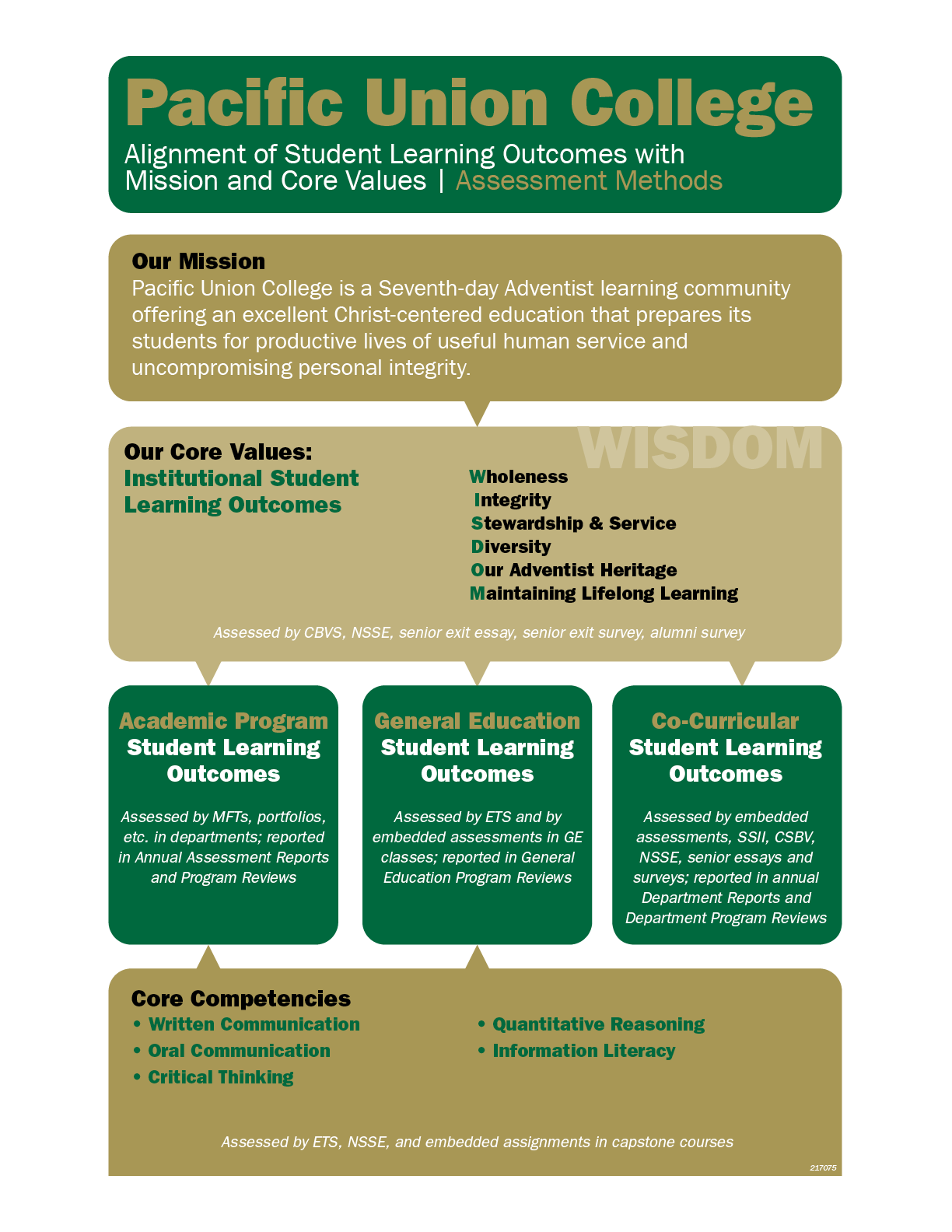Values and Student Learning Outcomes
PUC Mission Statement
Alignment of Student Learning Outcomes with Mission and Core Values | Assessment Methods
Pacific Union College is a Seventh-day Adventist learning community offering an excellent Christ-centered education that prepares its students for productive lives of useful human service and uncompromising personal integrity.
Our Mission Statement drives our student learning outcomes (SLOs) at every level. Our six institutional SLOs, (symbolized by the acronym WISDOM) unpack the core values implicit in our Mission Statement. These in turn lead to both our Academic Program and our Co-Curricular SLOs. We have identified Foundational skills that provide the basis for curricular and co-curricular SLOs, and these in turn feed into the General Education SLOs that support our Academic Program SLOs.
The Academic Dean's office provides guidelines for teachers and others needing to write student learning outcomes, and guidelines for writing a quality course syllabus are provided.
Our Core Values
Institutional Student Learning Outcomes
"Joyful is the person who finds WISDOM, the one who gains understanding" (Proverbs 3:13)
Wholeness
PUC graduates will make mature, independent choices integrating the needs of body, mind, and spirit.
Integrity
PUC graduates will live lives based on the highest ethical standards.
Service and Stewardship
PUC graduates will practice the Biblical imperatives to serve humanity, resist injustice, and care for the created world.
Diversity, Equity, and Inclusion
PUC graduates will display Intercultural competence and global understanding as informed members of a dynamic global church and world community.
Our Adventist Heritage
PUC graduates will understand and value the major tenets of Seventh-day Adventist Christian thought, including the blessing and significance of the Sabbath.
Maintaining Lifelong Learning
PUC graduates will continue to practice the intellectual skills and curiosity necessary to learn and grow creatively throughout life.
Core Competencies
- To think critically about complex issues;
- To write clearly and effectively in English;
- To communicate collaboratively with diverse others;
- To use quantitative techniques and data to solve problems; and
- To access and use appropriately a broad variety of resources and information.
Academic Program SLOs
The SLOs for each academic Major are included on the Curriculum Guidesheets.
Academic Program
Student Learning Outcomes
Assessed by MFTs, portfolios, etc. in departments; reported in Annual Assessment Reports and Program Reviews
General Education
Student Learning Outcomes
Assessed by ETS and by embedded assessments in GE classes: reported in General Education Program Reviews
Co-Curricular
Student Learning Outcomes
Assessed by embedded assessments, SSII, CSBV, NSSE, senior essays and surveys: reported in annual Department Reports and Department Program Reviews
General Education Student Learning Outcomes
I. Foundations of Learning
- Students will be able to write informative and persuasive essays that are clear and effective, that are supported by credible sources, and that demonstrate abilities to read and think critically
- Students will recognize and demonstrate effective speaking and listening skills in a variety of contexts: interpersonal relationships, small groups, and public presentations (including the appropriate use of relevant technology).
- Students will demonstrate basic algebra skills and reason critically in their use of statistical data.
II. Foundations of Faith
- Students will explain the historical and salvific meaning of Jesus, explore and critically analyze biblical texts and themes as well as Seventh-day Adventist beliefs and values, and integrate transformative faith perspectives with life in the contemporary world.
III. History and Social Science
- Students will apply the methods of the historian to think critically about historical developments and ideas within a broad cultural context.
- Students will employ the methods of the social scientist to think critically about human behavior and interaction, including how humans create and are influenced by social, cultural, economic, and political structures.
IV. Arts and Humanities
- Students will be able to read literature for pleasure and understanding, and think, read, and write critically about literary texts within a broad cultural context.
- Students will be able to think critically about the development of human knowledge and expression, appreciate the perspectives and contributions of people of other cultures and historical periods, and identify standards of aesthetic value.
V. Science
- Students will demonstrate knowledge of basic science, explain various methods of scientific inquiry, and reason critically about the applications of scientific information.
VI. Health and Fitness
- Students will demonstrate the knowledge, skills, and inclination necessary to sustain a healthy, well-balanced life.
VII. Practical and Applied Arts
- Students will demonstrate applied or manual skills in at least two separate areas.
VIII. Foreign Language (BA Students Only)
- Students will be able to read and communicate at the intermediate level in a foreign language or at the beginning level in two foreign languages. They will also be able to appreciate and think critically about another culture.

